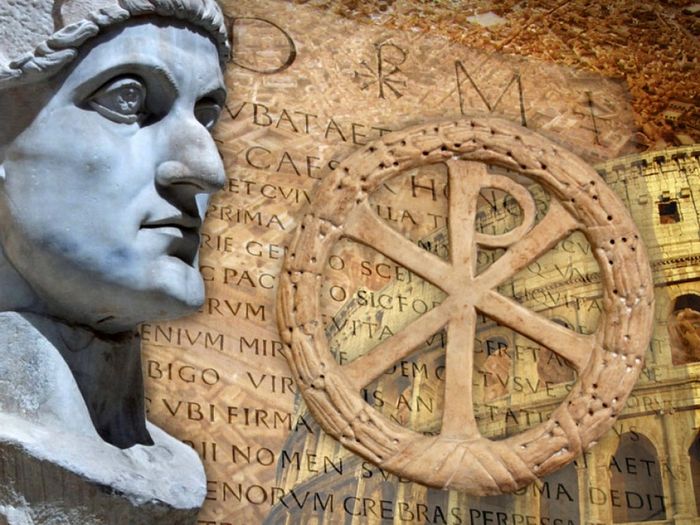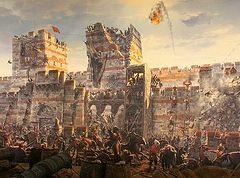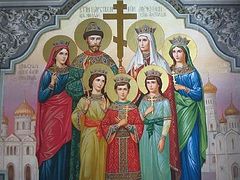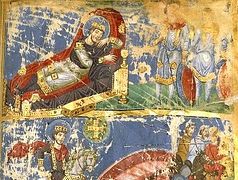This article was written by St. Hilarion (Troitsky), Archbishop of Verea, for the celebration of the 1600th anniversary of the Edict of Milan
When Moses shepherded the sheep of Jethro, his father-in-law, priest of Midian, he saw a bush burning with a hot fire, but the bush was not consumed by it. This image of a bush burning that is not consumed has been ascribed by certain ancient Church writers to Christ’s Church of the first centuries: For nearly three centuries it burned in the fire and was not consumed by it—to the contrary, it grew, blossomed, and brought forth fruit. The fiery flame of the Church’s trials would at times die down, then reignite with new and greater strength. There were the outbursts of the ignorant and superstitious crowds, who were ready to blame the Christians for all social ills, and therefore cried: “Christians to the lions!” There were distinguished rulers on the Roman throne, people of political ideas, under whom the nation flourished and the people prospered, but rulers viewed the Christians as traitors, a hindrance to the Roman ideals—and periods of civil prosperity were times of suffering for Christians. The Church underwent the most long-lasting and cruel persecutions precisely from the government. The closer pagan society got to know Christians, the more it loved them. Persecution, prescribed from the center, was often not met with sympathy in places were it was carried out. The pagans tried to persuade the confessors to spare their own lives. There were even cases when the pagan crowds would tear respected arrested Christians from the state convoys. After the edict issued by Galerius in 311, the return of Christians from exile and the mines to their places of residence bore at times an even triumphal character; and it was especially remarkable that they were met joyfully not only by their brothers in the faith, but also by pagans, who sincerely greeted them and congratulated their Christian co-citizens with their liberation.
And who did the government persecute? It persecuted its allies, who never betrayed it regardless of its numerous and endless offenses and injustices. In the book of the Acts of the Apostles we read: Now about that time Herod the king stretched forth his hands to vex certain of the church. And he killed James the brother of John with the sword. And because he saw it pleased the Jews, he proceeded further to take Peter also. (Then were the days of unleavened bread.) And when he had apprehended him, he put him in prison, and delivered him to four quaternions of soldiers to keep him; intending after Easter to bring him forth to the people (Acts 12:1–4). How did the apostle Peter respond? We can find it in his first epistle: Fear God, honour the king (Acts 1 Pet. 2:17). And another apostle writes to the Christians living in the center of political life, in the Eternal City, to which all roads led in antiquity: Let every soul be subject unto the lawful powers. For there is no power but of God: the powers that be are ordained of God. Whosoever therefore resisteth the power, resisteth the ordinance of God (Rom. 13–2). It would be natural for the government to persecute and pursue rioters, rebels, and revolutionaries; but to persecute preachers of humility and submission to authority—wouldn’t that be abnormal? The Roman government swallowed up religion; it turned out to be no more than one side of general national life. In the person of the Christian Church, a religion entered the world that is not subject to the state and does not mix with it, but supports the lawful authorities, honoring them as divinely instituted. From that time on possibilities opened for new relations between state and religion—the possibility for a an alliance between the Church and the government. The basis of this alliance lies not in the mutual benefit of the two sides entering into an alliance—no, but in the essence of the Church and state themselves. One involuntarily recalls the wise words of [Saint] Met. Philaret [Drozdov] of Moscow: “Yes, there is benefit when the altar and the throne are allied; however, it is not mutual benefit that comprises the primary foundation of their alliance but an independent truth supporting both one and the other. There is good and a blessing to the tsar, the protector of the altar; but the altar is not afraid it will fall without this protection. Right is the priest who preaches honor toward the tsar—not solely out of the law of mutual benefit, but out of pure obligation, no matter what should happen; only without hope in mutual benefit.” The alliance with the Church is needed first of all by the government. Is any law reliable if it is founded only upon the unstable sand of human opinion?
The Edict of Milan is the state’s admission that it needs the Church and that it ought to be just towards its benefactor. Isn’t this very thought clearly seen in the Edict’s very important words: “When I, Constantine Augustus, as well as I Licinius Augustus fortunately met near Mediolanurn (Milan), and were considering everything that pertained to the public welfare and security, we thought, among other things which we saw would be for the good of many, those regulations pertaining to the reverence of the Divinity ought certainly to be made first, so that we might grant to the Christians and others full authority to observe that religion which each preferred; whence any Divinity whatsoever in the seat of the heavens may be propitious and kindly disposed to us and all who are placed under our rule. And thus by this wholesome counsel and most upright provision we thought to arrange that no one whatsoever should be denied the opportunity to give his heart to the observance of the Christian religion, of that religion which he should think best for himself, so that the Supreme Deity, to whose worship we freely yield our hearts, may show in all things His usual favor and benevolence...”
The text of the Edict of Milan, according to historians, is not distinguished by clarity and definiteness, but by its excellent explanation given by Constantine himself in his relationship to the Christian Church. From those few documents that Eusebius preserved in his “History of the Church” it can be seen that to Constantine’s consciousness it was not Christianity as an abstract religious teaching being elevated but the Church, religious society, the corpus Christianorum. He orders the prelate Anilinus to take care that everything be returned to the Christians of the catholic Church that belongs to them in every city. The enemies of the catholic Church, though they might represent themselves as Christians, did not enjoy the emperor’s good favor. Constantine writes to Miltiadus, bishop of Rome: “My respect for the lawful catholic Church is not hidden from your attention, which respect causes me to desire that you would decisively not leave in a single place the slightest schism or division.” In his letter to Christus, bishop of Syracuse, the emperor recalls: “When certain people began to think poorly and mistakenly about the worship of God, to depart from the holy and heavenly power and rend asunder the catholic Church, I desired to stop this enmity.” Constantine writes to the proconsul of Africa Ablabius how troubled he is by the Donatist schism, which might evoke “the wrath of the supreme Divinity not only against the human race, but also against me, to whom this earthly governmental care has been entrusted by the will of God. I cannot remain entirely at peace until all my subjects, united in fraternal oneness of mind, shall render unto God the true worship as prescribed by the catholic faith.”
Constantine openly confessed that it was by no means a matter of indifference for the benefit of the nation which faith its members hold to. From this is it a direct crossover to the possibility of state support for the true Church. “Having considered it well to send something for expenses to certain known servants of the lawful and most holy catholic divine worship in all the dioceses of Africa, Numidia, and Mauritania,” Constantine commands by a special grammota the African treasurer Ursus to disburse three thousand coins. “If in carrying out my wish you see that it is not enough, then doubting nothing you may demand as much as you see is needed from the guardian of our property Praclidus, whom I have personally ordered to give you money as you request it without any delay.” The proconsul Anilinus and the vicar of the prefects Patricius were given orders to be particularly watchful over those troublemakers who “through shameful deceit dare to pervert the people within the holy catholic Church.” There are quite important discussions by Constantine in one letter to Anilinus. Here the emperor admits that preservation of true worship of God “by the good will of God has granted the Roman state very great prosperity and particular happiness in all human affairs.” “Therefore, I would like that in the province entrusted to you, persons of the catholic Church who have dedicated themselves to the service of this holy faith and ordinarily called clerics should remain absolutely free of all social obligations.” “For if they will serve the Divinity with all zeal, then it seems that great benefit will occur in social affairs.” This is the legal explanation for the Edict of Milan!
The Edict of Milan is the borderline between the persecuted Church and the state Church. An end was placed to the state’s injustice toward its well-wisher, the Church; the state wants to be grateful for this benefit that it receives from the truth—that is, from the Church, and strives to protect truth itself from the distortions of heretics and schismatics. The state understood that to shake this truth would mean to upset all order and all law. Truth should reign over lies and error. The Edict of Milan is the powers that be openly bowing down before the truth, the state bowing down before the Church, earth before Heaven, and royalty before the priesthood.
The Church was persecuted. There were falls, there were the fallen, but there was also much heroism. Christian martyrs are the incomparable representatives of the strength of the human soul, steadfastness of conviction, and the boundlessness of self-denial. But the era of persecution in the life of the Church was an abnormal period. The Church did not seek persecution and judged those fanatics who sought persecution as a positive aim. The Church always rejoiced when persecutions ended; the mouths and pens of apologists asked justice of the state. In fulfilling the apostle’s commandment, we now also pray that the Lord would speak peace and goodness about His holy Church in the hearts of government authorities, so that people might have a quiet and peaceful life in right faith and in all piety and purity. Accepting itself as the true Church, the Church only desires that the truth reign, and that it not be persecuted by those people for whose sake it was created on earth through the incarnation of the Only Begotten Son of God.
There is always a certain amount of heroism in the human soul. In the persecuted Church it comes to the surface in martyrdom. In the state Church, other ways are shown for its application. Heroism is in the struggle with sin, in that battle “unto blood” about which the apostle Paul speaks (Heb. 12:4). Is it any accident that after persecutions ceased the development began of monasticism, the hermetic life, and the labors of ascetics? Martyrs are the heroes of the persecuted Church, and ascetics are the heroes of the state Church. The suffering of martyrs and the lives of monastic saints are edifying, for they comprise two parts of one and the same grandiose poem in honor of the Christian soul, in honor of the strength of the human spirit, which is eternal and invincible.
Source: Moscow Church news, 1913, No. 37. Russian text from: Holy Hieromartyr Hilarion (Troitsky). Works, v. 3 (Moscow: Sretensky Monastery, 2004), 278-82.




